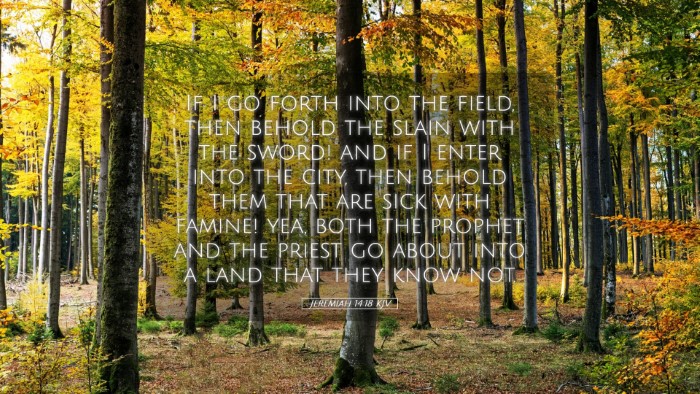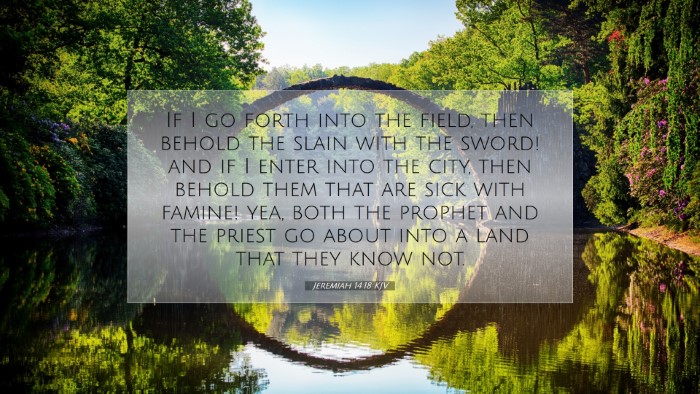Bible Commentary on Jeremiah 14:18
Jeremiah 14:18 states:
"If I go forth into the field, then behold the slain with the sword! And if I enter into the city, then behold them that are sick with the famine! Yea, both the prophet and the priest go about to a land that they know not."
Contextual Overview
Jeremiah 14:18 is situated within a larger context of the lamentations of the prophet Jeremiah, mourning over the desolation and judgment that has come upon Judah due to their unfaithfulness to God. The imagery of death through the sword and famine speaks to the dire consequences of sin and the pervasive nature of God’s judgment. This verse encapsulates the prophet's despair and the hopeless condition of the people.
Insights from Public Domain Commentaries
Matthew Henry's Commentary
Desolation and Loss: According to Matthew Henry, this verse emphasizes the despair found both in the field and in the city. The slain in the fields signify the might of war, while the sick in the city indicate the effects of famine and scarcity. This portrays the totality of disaster that has befallen the people of Judah, showing that there are no safe places left.
Role of the Prophet and Priest: Henry highlights the significance of the roles of the prophet and the priest, both of whom are depicted as wandering into a land they do not know, illustrating the disconnect between religious leadership and the spiritual state of the nation. The spiritual leaders are described as lost, underscoring the futility of their efforts to lead the people back to God amidst such widespread judgment.
Albert Barnes' Notes on the Bible
The Suffering of the People: Barnes points out that the conditions Jeremiah describes reflect both physical and spiritual suffering. The prophet not only witnesses death but also experiences the emotional toll of the people's suffering. This connection to suffering serves as a reminder of the consequences of sin and the call for repentance.
Mourning as Ministry: Additionally, Barnes comments on the prophet's role in this tribulation, suggesting that Jeremiah’s lamentation can be interpreted as a form of ministry itself. Through his grief, he brings awareness to the people of their sins and the resulting divine judgment, serving as a conduit for the grieving heart of God towards His people.
Adam Clarke's Commentary
The Contrast of Life and Death: Adam Clarke remarks on the stark contrast between life and death presented in this verse. The slain in battle and the sick from famine illustrate two catastrophic outcomes of God’s judgment upon a rebellious nation. Clarke emphasizes that both conditions serve as a potent illustration of God's displeasure against sin.
Prophet and Priest's Futility: Clarke also notes the futility of the prophet and priest as they roam in a land they do not know, which speaks to the loss of purpose in their calling due to sin's impact on the nation. This loss reflects not just a geographical wandering but a spiritual disorientation that ultimately leads to despair.
Theological Implications
The verses encapsulate a profound theology of judgment and mercy. The reality of God’s judgment is evident in the collective suffering of the people, and yet it serves as a call to repentance. The imagery used by Jeremiah highlights the urgent need for God’s people to recognize their sinful state and turn back to Him.
Call to Repentance: In the narrative of Jeremiah, there is a persistent theme of returning to God. This verse poignantly reminds pastors, students, and theologians that spiritual renewal often comes from the recognition of sin and a heartfelt return to the Lord.
The Role of Leadership: The plight of the prophet and priest serves as a warning about the responsibilities of spiritual leadership. They are not only to proclaim the word of God but also to embody it, leading by example. Their disorientation reflects a broader truth about the necessity of faithfulness amidst trials.
Pastoral Application
- Empathy in Leadership: Pastors today must empathize with the mourning of their congregations, understanding that shared grief can be instrumental in ministry.
- Encouraging Repentance: Encourage congregants to acknowledge their sin and turn to God, highlighting that repentance is the pathway to restoration.
- Vigilance in Teaching: Teach the whole counsel of God, ensuring that the consequences of sin and the grace of God are both clearly presented.
Conclusion
Jeremiah 14:18 serves as a poignant reflection of the devastation wrought by sin and the dispiriting conditions of a people estranged from God. Through insights drawn from Matthew Henry, Albert Barnes, and Adam Clarke, we see a rich tapestry of theological truths interwoven with pastoral wisdom. It stresses the vital need for leaders and the faithful to recognize their spiritual condition, embrace repentance, and bear witness to the hope found in God's mercy, even amidst profound judgment.


